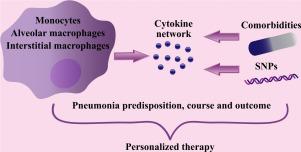Cytokine & Growth Factor Reviews ( IF 13.0 ) Pub Date : 2020-12-03 , DOI: 10.1016/j.cytogfr.2020.11.003 Marina Dukhinova 1 , Elena Kokinos 1 , Polina Kuchur 1 , Alexey Komissarov 1 , Anna Shtro 2

|
Macrophages represent the first line of anti-pathogen defense - they encounter invading pathogens to perform the phagocytic activity, to deliver the plethora of pro- and anti-inflammatory cytokines, and to shape the tissue microenvironment. Throughout pneumonia course, alveolar macrophages and infiltrated blood monocytes produce increasing cytokine amounts, which activates the antiviral/antibacterial immunity but can also provoke the risk of the so-called cytokine “storm” and normal tissue damage. Subsequently, the question of how the cytokine spectrum is shaped and balanced in the pneumonia context remains a hot topic in medical immunology, particularly in the COVID19 pandemic era. The diversity in cytokine profiles, involved in pneumonia pathogenesis, is determined by the variations in cytokine-receptor interactions, which may lead to severe cytokine storm and functional decline of particular tissues and organs, for example, cardiovascular and respiratory systems. Cytokines and their receptors form unique profiles in individual patients, depending on the (a) microenvironmental context (comorbidities and associated treatment), (b) lung monocyte heterogeneity, and (c) genetic variations. These multidisciplinary strategies can be proactively considered beforehand and during the pneumonia course and potentially allow the new age of personalized immunotherapy.
中文翻译:

肺炎中巨噬细胞衍生的细胞因子:连接细胞免疫学和遗传学
巨噬细胞代表抗病原体防御的第一道防线——它们遇到入侵的病原体以进行吞噬活动,输送过多的促炎和抗炎细胞因子,并塑造组织微环境。在整个肺炎过程中,肺泡巨噬细胞和浸润的血液单核细胞产生越来越多的细胞因子,这会激活抗病毒/抗菌免疫,但也会引发所谓的细胞因子“风暴”和正常组织损伤的风险。随后,细胞因子谱在肺炎背景下如何形成和平衡的问题仍然是医学免疫学的热门话题,尤其是在 COVID19 大流行时代。参与肺炎发病机制的细胞因子谱的多样性取决于细胞因子-受体相互作用的变化,这可能导致严重的细胞因子风暴和特定组织和器官的功能下降,例如心血管和呼吸系统。细胞因子及其受体在个体患者中形成独特的特征,这取决于 (a) 微环境背景(合并症和相关治疗)、(b) 肺单核细胞异质性和 (c) 遗传变异。这些多学科策略可以在肺炎病程之前和期间主动考虑,并有可能开启个性化免疫治疗的新时代。(b) 肺单核细胞异质性,和 (c) 遗传变异。这些多学科策略可以在肺炎病程之前和期间主动考虑,并有可能开启个性化免疫治疗的新时代。(b) 肺单核细胞异质性,和 (c) 遗传变异。这些多学科策略可以在肺炎病程之前和期间主动考虑,并有可能开启个性化免疫治疗的新时代。


























 京公网安备 11010802027423号
京公网安备 11010802027423号